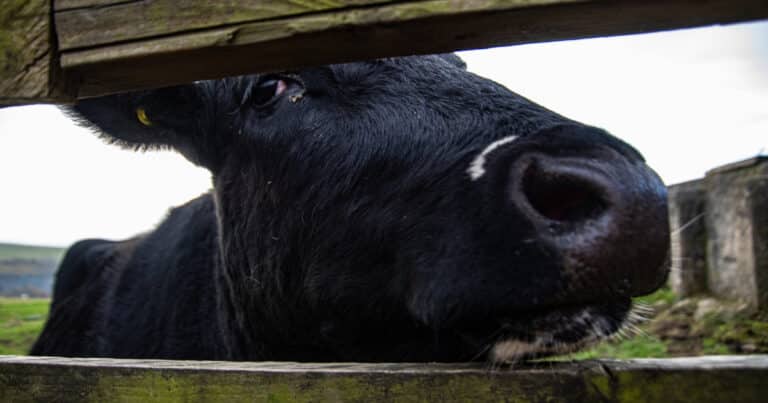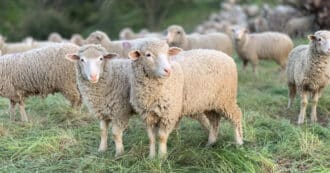By Fran Hawthorne
Organic. Free-range. Cage-free. Barn-roaming. Free-roaming. Local. Natural. No preservatives. No antibiotics. No added hormones. No added steroids. No animal byproducts. Not genetically modified. Grass-fed. Vegetarian diet. Family-farmed. Certified humane-raised. Sustainable. Dolphin Safe. Fair-trade. Vegetarian. Vegan. Kosher. Halal.
Where does the food come from? How many pounds of greenhouse gases did it take to grow, package, and transport the food? If it’s from a developing country, were the local farmers compensated according to fair-trade criteria? How are the workers treated? Do they get proper training and safety equipment? Are they unionized? If animals are involved, how are they treated? Are they allowed to go outdoors? How much space do they get? What are they fed? What kind of fertilizer is used? If the product includes fish, is the species endangered? Were any at-risk habitats damaged to grow the crops or raise the animals? Is the packaging recyclable?
“Choosing food is now so complicated, between the environmental destruction, cruelty to animals, exploitation of workers, and carbon production due to transport,” summarized University of Virginia psychology professor Jonathan Haidt.
Among this confusion of choices, even non-Jews have generally considered kosher meat a bit more ethical than standard cuts, because the laws of kashrut require what are supposed to be humane methods of slaughter. The animal must be killed with one smooth cut to the throat, using a knife with no nicks, so that the death can be as quick and painless as possible.
Kosher carnivores can also feel a little smug that they’re not eating pigs – which ethicist Peter Singer claims “have cognitive functioning abilities similar to that of a three-year-old human child,” and which are crammed into gestation crates with no room to turn around. Nor are kashrut-observant Jews guilty of eating factory-farmed shrimp that are destroying the environment of countries like Bangladesh, Ecuador, Honduras and Thailand. In those countries, the local water sources are drained to supply the farms; then that farm water, polluted with salt, fish meal food, growth stimulants, and antibiotics, leaks back into the nearby land and water, wrecking it for either farming or fishing. The shrimp farm owners also frequently cut down the mangrove swamps that protected the area from tropical storms and floods, provided shelter for other animals, and helped nurture native fisheries.
“Okay, we can eat meat, but we can’t gobble all flesh down indiscriminately.”
And keeping kosher isn’t just about the species that are shunned or the kind of knife that’s used. Many Jews say it makes them stop and think about the animals they’re eating. According to some scholars, the rules spiritually connect the killing of animals for eating with the killing of animals for ritual sacrifice, in order to remind people of God as the source of their food. Another view is that the dietary laws represent a compromise with the original vegetarian lifestyle in the Garden of Eden, which imperfect humans were ultimately unable to maintain. (“See, I give you every seed-bearing plant that is upon the earth, and every tree that has seed-bearing fruit; they shall be yours for food” – Genesis I:29) It’s as though the laws of kashrut say: Okay, we can eat meat, but we can’t gobble all flesh down indiscriminately.
Tza’ar ba’alei chayim, or the prevention of cruelty to animals
There is, as well, a concept in Judaism known as tza’ar ba’alei chayim, or the prevention of cruelty to animals. However, this has never precluded observant Jews from using animals for heavy farm work or eating them, and it has not traditionally been incorporated as part of the kosher laws.
With the burgeoning of vegetarianism, animal rights, environmentalism, and the consumer movement in recent years, more and more Jews became troubled by the idea that their dietary laws seemed to care about animals only at the moment of death, not throughout their life. Nor did the laws of kashrut talk about how to treat the workers who handle the animals (though other Jewish laws do).
In 2007 the official Rabbinical Assembly of Conservative Judaism in the U.S. set up a six-member commission of rabbis and lay people to write a hekhsher tzedek, or a voluntary kosher certification that would add workers’ pay and safety, environmental impact, corporate behavior, and animal welfare to the traditional laws. “Over the last twenty years, the observance of kashrut was increasingly seen as related to ritual minutia. Broccoli was questionable because of the potential of microscopic bugs existing,” explained Morris Allen, the rabbi of Beth Jacob Congregation in Mendota Heights, Minnesota (a small city near Minneapolis), who spearheaded the drive for the hekhsher tzedek. “Is it appropriate for us to call something kosher if it meets the ritual demands of the Jewish people, but is produced in a way that people are exploited? Is that what we want to say about ourselves?”
In the committee’s guidelines, which were formally approved in 2008, the animal-welfare section seems like a contradictory mix of ethical and business-pleasing criteria. It promises that companies “will be favored for the Hekhsher if they adhere to the Humane Farm Animal Care Standards” (that is, the standards of the Humane Farm Animal Care organization, a respected nonprofit based in Virginia, which certifies humane treatment of farm animals). These standards require that animals be able to “engage in their natural behavior,” with “sufficient space, shelter and gentle handling to limit stress” and a diet free of added hormones and antibiotics. Sounds great. But the hekhsher tzedek also tells companies to follow guidelines endorsed by a slew of U.S. food-industry groups, such as the American Meat Institute, the National Cattlemen’s Beef Association, and the National Chicken Council. Bruce G. Friedrich, vice president of the international grassroots campaign of the U.S. animal rights group People for the Ethical Treatment of Animals (PETA), scoffed that “it’s no better than industry standard. All of the standard mutilations without pain relief are allowed, as are cramming hens into cages and calves into crates.” In fact, Friedrich and Paul Shapiro, senior director of the U.S. Humane Society’s factory farming campaign, are only marginally impressed with kosher ritual in general. “In its ideal, it is” more humane, Friedrich allowed, but then he pointed to scandals like the abuse of workers and animals at the meatpacker Agriprocessors Inc. as an example of how the laws aren’t always carried out in practice.
The Case of Agriprocessors
The Agriprocessors story started in the 1980s in the small town of Postville in northeastern Iowa, where Agriprocessors established a slaughterhouse that carefully followed all the ritual rules. After thoroughly cleaning and refurbishing an abandoned meatpacking plant, the company brought in rabbis to certify that the cattle and chickens were killed in the appropriate manner, with the appropriate knives, to minimize suffering. And for the next two decades, the main course of most American kosher meals came from that slaughterhouse.
But in May 2008, inspectors from the federal Immigration and Customs Enforcement Agency and other government bureaus found that nearly 400 illegal immigrants were working at the plant, including children as young as thirteen, many of them under dangerous conditions, without proper safety training, cheated out of overtime pay, forced to work twelve hours at a stretch, yelled at, sexually harassed, and pressured to keep working even after they were injured on the job. The Iowa attorney general ultimately charged Agriprocessors with over nine thousand violations of child-labor laws, while the state labor department issued thirty-one citations for safety problems and fined the company $10 million for breaking state wage laws. On top of that, PETA twice filmed surreptitious videos showing workers slicing animals with painful, nonkosher cuts. All this followed hundreds of citations and fines for environmental, health, and safety violations over the prior couple of years.
Within six months, Agriprocessors’s chief executive was forced out and then arrested for harboring illegal immigrants; the Union of Orthodox Jewish Congregations of America threatened to withdraw its official kosher certification; the Conservative movement issued its hekhsher tzedek label regarding the treatment of animals, workers, and the environment; and Agriprocessors filed for bankruptcy. News reports jumped on the irony of a company getting the highest religious certification for its treatment of animals while its workers were treated in the lowest possible ways.
Still, the hekhsher tzedek isn’t the end of the story.
For Carie Carter, rabbi of the Park Slope Jewish Center in Brooklyn, N.Y. – the Conservative synagogue I belong to — food juggling begins with one clear requirement: “If it’s not kosher, I’m not going to eat it.” The next steps are more complex. “If it’s kosher but animals are not treated humanely and workers are treated poorly, I’m not going to eat it.” However, that’s almost impossible to know unless conditions are so bad that they make news, as happened with Agriprocessors. On top of all those considerations, Rabbi Carter has been making more efforts to buy organic food since her daughter, Noa, was born in 2007. Organic produce is fairly easy to find, but kosher organic chicken is a problem.
With some searching, Americans can find suppliers like KOL (for Kosher Organic-Raised Local) Foods, founded in July 2007, which sells grass-fed, organic, local, kosher meat through six “buying clubs” in Philadelphia, Washington DC, New Jersey, Maryland, and the New York City metro area. Rabbi Carter’s compromise is that she will get nonorganic kosher chicken from a company that at least hasn’t had any bad headlines.
As long as we’re putting something in our mouths and chewing, we’re probably hurting some creature that lives on the planet. Nevertheless, these new efforts are a lot better than the ethical vacuum that existed before.
So, yes, an ethical liberal can eat meat, kosher or not – carefully. And, I think, with some inevitable guilt.
Adapted from: The Overloaded Liberal: Shopping, Investing, Parenting, and Other Daily Dilemmas in an Age of Political Activism, by Fran Hawthorne, Copyright 2010.
Reprinted with permission by Beacon Press
About the Author

Fran Hawthorne is the author of the award-winning Ethical Chic: The Inside Story of the Companies We Think We Love (Beacon Press) and seven other books about business, consumers and social issues. She writes regularly for The New York Times, Newsday, Institutional Investor, and other publications.





